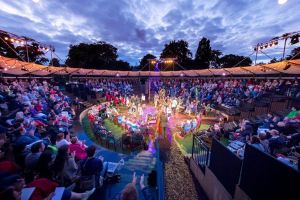Honour Bayes: Lyric keeps it local
A blend of robust poetry and agile circus, I was recently wowed by Ockham’s Razor’s Not Until We Are Lost at Artsdepot. But it wasn’t only the stunning aerialism that captured me – just as impressive was the skill displayed by a choir of local singers who had been brought together for these performances.
As highly trained artists twisted and turned above, they were cradled by the delicate harmonies of volunteers who mingled amongst us. It was a beautifully interwoven marriage, one which worked artistically but also grounded Not Until We Are Lost firmly in the first location on its tour.
As this show travels the UK, each choir will have a unique connection to their surroundings and the performances will change, embedding the piece into every community it is played in.
Community theatre used to be a downtrodden term but these days it’s becoming a go-to phrase. Regional and fringe theatres are learning that home is where the heart is with many projects looking around their neighbourhoods for inspiration. While in the spirit of X Factor, the West End is opening up auditions to encourage everyone to feel they can be part of the action.
Artistic director of the Lyric Hammersmith Sean Holmes is a master of this – though with a lot more integrity than X Factor. During his tenure at this west London theatre he has created a connection with the Hammersmith community that grows from show to show, programme to programme. Their panto regularly proves this but current show, the award-winning Morning, is another fantastic example.
Created with and cast entirely from members of the Lyric Young Company, Simon Stephens’ searching new play is building relationships with both its future artists – the epic Michael Czepiel is surely a sound designer to keep a sharp eye on – and audiences. I don’t think I’ve ever seen such a predominantly teenage audience for a piece of new writing as filled this theatre on Thursday night.
The feeling of ownership in the space was vast as hundreds of eyes watched their peers on stage working on challenging and sophisticated material. I was getting to watch Stephens’ play with the demographic he had written it for. If they’d cast adult actors I don’t think I would have had the chance to do so.
Without wanting to sound mercenary, this readymade audience also enables Holmes to programme a piece of work which otherwise may have not have kept the box office happy. In this way community engagement is enabling avant-garde work to flourish.
As theatre searches to show it is indispensable in a recession-riddled society, this method of direct engagement ensures the stories told on stage are everyone’s. And as the excellent Not Until We Are Lost and Morning show, form does not have to be compromised in this process; in fact it is often enriched and expanded.
Ultimately these opportunities pierce the heart of the performer/audience relationship and take us closer towards those moments of communion that we cherish. In an increasingly individualistic society, that seems pretty indispensable to me.












